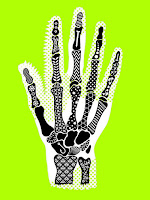Continuing our conversation on A.N Whitehead and materialism (
here) Matt Segall writes:
“Part of why I find Whitehead’s “panprehensionism” to be such an important contribution to metaphysics is that I have not found any way of explaining the “emergence” of feeling, or sentience, or mind out of otherwise dead, insensate stuff.”
I think that is exactly the problem with most arguments against materialist philosophies. What contemporary materialist would argue that matter-energy is “dead, insensate stuff”?
For example, Levi Bryant (see
here and
here) and I share the view that all objects and all materials are active systems. In fact, for many of us ‘to be’ is precisely ‘to act’, or to be active, alive and expressive. An ‘object’ is characterized by what it can do, its capacities or powers. Even the most basic materials are assemblages of energetic, moving, vibrating systems (cf.
string theory). This is what I refer to when I use the term
potency. All materials are complex assemblages of potency. Matter is in
no way “dead”.
The interesting issue here is that potent materials can take on emergent properties as they become more complex (through catalytic reactions, complementary powers as combining in such a way as to enhance or emphasize each other's qualities, amplifications of capacity, etc). In this view it is not difficult to image how micro potencies could be organized into macro complexes of sensitive operation. Like Whitehead I share the idea that the cosmos is inherently sensate or potent. But ‘experience’ and sentience are emergent features of compounded and complexified potencies arranged and evolved in particular ways, and not present from the start.

This could lead me to talk about Merleau-Ponty’s notion of
flesh as describing the elemental sensuality and tangibility of reality, but I’ll leave that for now. (see
here)
Matt continues:
"As Deacon put it himself, not only do we not have a theory for how sentience might emerge from dead matter, we don’t even have an understanding of what such a theory might involve. His work in Incomplete Nature is an attempt to explain the emergence of form, not so much feeling or consciousness.”
At the very least I think it will entail giving up the notion that matter is “dead”. In fact nothing in this cosmos is dead. Compositions come and they go, and matter and energy are arranged, implicated and evolve then decomposed and re-implicated. But nowhere do we find completely impotent materials. I believe understanding
how this is so is the fundamental insight necessary for enacting truly ecological thoughts and action.
Matt writes:
"Whitehead doesn’t think we can explain feeling by offering some theory about it, since feeling (like value) is simply a fundamental fact about the way things are. The reality of feeling is the condition of the possibility of explanation and so cannot itself be explained.”
I disagree. I think you are right to imply that the condition for the possibility of explanation is that feeling exists, but this in no way means that we cannot (or should not) explain historically and in detail how rudimentary sensitivities evolved into the capacity for cognition , speech or explanation. The fact that we live in a cosmos of active influence and causal potency should not necessary lead us to conclude that those primal vibrancies should be characterized as anything like “experience” or sentience or feeling in the original sense of these terms. Sentience and experience are emergent capacities and we should not assume their existence prior to their
advent, in the same way a bird’s emergent ability to sing shouldn’t lead us to argue that atoms or individual molecules have an inherent capacity for song.
Matt writes:
"Whitehead’s panprehensionism is a direct consequence of his process ontology. There are no bits of dead material existing at an instant in his cosmos. There are durations, aka actual occasions, which, since they exist as temporally thick moments (remembering the past as they anticipate the future) are necessarily experiential. Experience is not the same as “mind,” for Whitehead, but rather the most basic form of temporal existence.”
Again, I think one of my main issues with Whitehead is his terminology. I can’t get past the way he anthropomorphizes the cosmos. Even if his ontology is in many respects close to the kind of story I want to tell about reality (e.g., occasions of emergent forms of potency), his discourse seems very misguided. I can’t imagine why we would argue that a hydrogen atom “remembers” or “anticipates”? There has got to be a better, non-mentalistic way to describe the interactions between non-sentient complexes?
Whitehead seems to build in the role of consciousness from the start as a way to explain its latter elaboration in humans without, in my limited opinion, taking care to address the particularities (onto-specificities) of its emergence. “Mind” emerged from primordial processes not the other way around. And saying that experience is everywhere seems to me the same as saying experience is nowhere. It just doesn’t explain. Whereas, for me, the term “experience” refers to a particular kind of
operation and not a general property and so must be reserved for entities with the capacity for recursion and some kind of memory. I find the term
potency is better suited to constructing a more nuanced description since it signals a primal property rather than a bio-specific operation.
Disclaimer: To be sure, my understanding of Whitehead's whole system is less than adequate to the task of critique in any meaningful way. Many of my issues with his work have to do with what I perceive to be his most general claims as well as his terminology. At this point I guess I could simply say that his philosophy just doesn't seem to resonate with me. Oh well.










